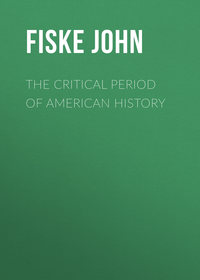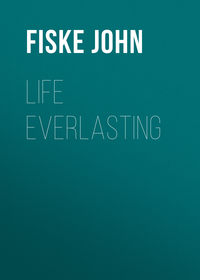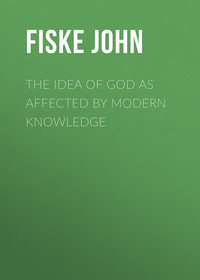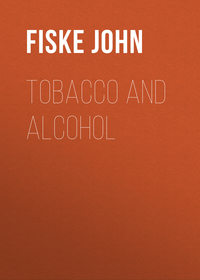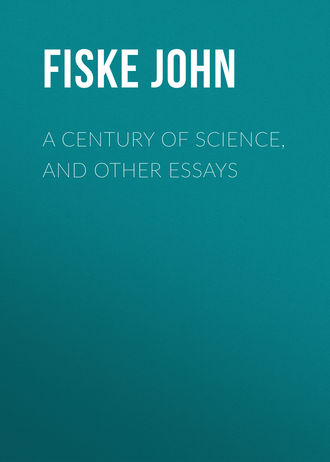 полная версия
полная версияA Century of Science, and Other Essays
From these grotesque rigmaroles it is not a long step to the lucubrations of the writers in whose bonnets the bee of prophecy has buzzed until they have come to fancy themselves skilled interpreters. There is apt to be the same droll mixing of arithmetic with history that we find among the pyramid cranks, and to the performance of such antics the book of Daniel and the Apocalypse present irresistible temptations. In my library days, I never used to pick up a commentary on either of those books without looking for some of the stigmata or witch-marks of crankery. Many a feeble intellect has been toppled over by that shining image, with head of gold and feet of iron and clay, which Nebuchadnezzar beheld in a dream. For example, let us take a few sentences from "Emmanuel: An Original and Exhaustive Commentary on Creation and Providence Alike. By an Octogenarian Layman," London, 1883, pp. 420: "Upwards of thirty years ago, a fancy for chronological research, fostered by boundless leisure and a competent facility in mental calculation, riveted my attention on the metallic image, in the vague hope of symmetrizing the four sections of the collective emblem with the successive dominations of the individual empires. Failing in so shadowy an aspiration, I seemed to be more than compensated by detecting an identity of duration, equally pregnant and positive, between the gold and the silver and the brass and the iron taken together on the one hand, and the mountain that was to crush them all to powder on the other, – the former aggregate being assumed to stretch from Nebuchadnezzar's succession in 606 b. c. to the dethronement of Augustulus in 476 a. d., and the latter again from the epoch just specified to Elizabeth's purgation of the Sanctuary in 1558." Having thus taken two equal periods of 1082 years, our Octogenarian proceeds to break them up (Heaven knows why!) each into four periods of 68, 204, 269, and 541 years. Then we are treated to the following equations: —
68 = 2 × 34
204 = 6 × 34
269 = 5 × 34 + 3 × 33
541 = 13 × 34 + 3 × 33
Hence, "with such a fulcrum as the Lamb slain before the foundation of the world, and such a lever as the span of the Victim's sublunary humiliation, was I too rash in aiming at a result infinitely grander than Archimedes's speculative displacement of the earth?"
That eminent mathematician, Dr. Nathaniel Bowditch, used to say that sometimes, when Laplace passed from one equation to the next with an "evidently," he would find a week's study necessary to cross the abyss which the transcendent mind of the master traversed in a single leap. I fancy that more than a week would be needed to fathom the Octogenarian's "hence," and it would by no means be worth while to go through so much and get so little. After a few pages of the Octogenarian, we are prepared to hear that in 1750 one Henry Sullamar squared the circle by the number of the Beast with seven heads and ten horns; and that in 1753 a certain French officer, M. de Causans, "cut a circular piece of turf, squared it, and deduced original sin and the Trinity."49
The reader is doubtless by this time weary of so much tomfoolery; but as it is needful, for the due comprehension of crankery and its crotchets, that he should by and by have still more of it, I will give him a moment's relief while I tell of a little game with which De Morgan and Whewell once amused themselves. The task was to make a sentence which should contain all the letters of the alphabet, and each only once. "No one," says De Morgan, "has done it with v and j treated as consonants; but you and I can do it" (u and i: oh, monstrous pun!). Dr. Whewell got only separate words, and failed to make a sentence: phiz, styx, wrong, buck, flame, quid. Very pretty, but De Morgan beat him out of sight with this weird sentiment; I, quartz pyx, who fling muck beds! Well, what in the world can that mean? "I long thought that no human being could say it under any circumstances. At last I happened to be reading a religious writer – as he thought himself – who threw aspersions on his opponents thick and threefold. Heyday! came into my head, this fellow flings muck beds: he must be a quartz pyx. And then I remembered that a pyx is a sacred vessel, and quartz is a hard stone, as hard as the heart of a religious foe-curser. So that the line is the motto of the ferocious sectarian, who turns his religious vessels into mud-holders for the benefit of those who will not see what he sees."50
I cite this drollery to show the world-wide difference between the playful nonsense of the wise man and the strenuous nonsense of the monomaniac; in this little cabbala alphabetica, moreover, a great deal of the cabalistic lore which cumbers library shelves is neatly satirized.
As already observed, my rule was never to put into the class of eccentric literature any books save such as seemed to have emanated from diseased brains. To hold and absurd belief, to write in its defense, to shape one's career in accordance with it, is no proof of an unsound mind. Of the hundreds of enthusiasts who spent their lives in quest of the philosopher's stone, many were doubtless cranks; but many were able thinkers who made the best use they could of the scientific resources of the time. Wrong ways must often be tried before the right way can be found. Even the early circle-squarers cannot fairly be charged with crankery; they sinned against no light that was accessible to them. But anybody who to-day should advertise a recipe for turning base metals into gold would meet with a chill welcome from chemists. He would speedily be posted as a quack, though doubtless many weak heads would be turned by him. It is the perverse sinning against light that is one of the most abiding features of crankery, and from this point of view such a book as "Coin's Financial School" has many claims for admission to the limbo of eccentric literature.
About seventy years ago, one John Ranking published in London a volume entitled "Historical Researches on the Conquest of Peru, Mexico, Bogota, Natchez, and Talomeco,51 in the Thirteenth Century, by the Mongols, accompanied with Elephants." It is well known that in 1281 the Mongols, after conquering pretty much everything from the Carpathian Mountains and the river Euphrates to the Yellow Sea, invaded Japan. A typhoon dispersed their fleet; and their army of more than 100,000 men, cut off from its communications, was completely annihilated by the Japanese. But Mr. Ranking believed that this wholesale destruction was a fiction of the chroniclers. He maintained that most of the army escaped in a new fleet and crossed the Pacific Ocean, taking with them a host of elephants, with the aid of which they made extensive conquests in America and founded kingdoms in Mexico and Peru. The widespread fossil remains of the American mastodon he took to be the bones of these Mongolian elephants. Now, this is an extremely wild theory, unsound and untenable in every particular, but it does not bring Mr. Ranking's book within the class of eccentric literature. The author was deficient in scholarship and in critical judgment, but he was not daft.
A very different verdict must be rendered in the case of Mr. Edwin Johnson's book, called "The Rise of Christendom," published in London in 1890, an octavo of 500 pages. According to Mr. Johnson, the rise of Christendom began in the twelfth century of our era, and it was preceded by two centuries of Hebrew religion, which started in Moslem Spain! First came Islam, then Judaism, then Christianity. The genesis of both the latter was connected with that revolt against Islam which we call the Crusades. What we suppose to be the history of Israel, as well as that of the first eleven Christian centuries, is a gigantic lie, concocted in the thirteenth century by the monks of St. Basil and St. Benedict. The Roman emperors knew nothing of Christianity, and the multifarious allusions to it in ancient writers were all explained by Mr. Johnson as fraudulent interpolations. As for the Greek and Latin fathers, they never existed. "The excellent stylist, who writes under the name of Lactantius, not earlier than the fourteenth century;" "the Augustinian of the fourteenth or fifteenth century, who writes the romantic Confessions," – such is the airy way in which the matter is disposed of. As for the New Testament, "it is not yet clear whether the book was first written in Latin or in Greek." This reminds me of something once said by Rev. Robert Taylor, a crazy clergyman who in 1821 suffered imprisonment for blasphemy, and came to be known as the Devil's Chaplain. Taylor declared that for the book of Revelation there was no Greek original at all, but Erasmus wrote it in Switzerland, in the year 1516. The audience, or part of it, probably took Taylor's word as sufficient; and in like manner not a syllable of proof is alleged for Mr. Johnson's prodigious assertions. From cover to cover, there is no trace of a consciousness that proof is needed; it is simply, Thus saith Edwin Johnson. The man who can write such a book is surely incapable of making a valid will.
Another acute phase of insanity is exemplified in Nason's "History of the Prehistoric Ages, written by the Ancient Historic Band of Spirits" (Chicago, 1880). This is a mediumistic affair. The ancient band consists of four-and-twenty spirits, the eldest of whom occupied a material body 46,000 years ago, and the youngest 3000 years ago. They dictated to Mr. Nason the narrative, which begins with the origin of the solar system and comes down to Romulus and Remus, betraying on every page the preternatural dullness and ignorance so characteristic of all the spirits with whom mediums have dealings.
Concerning the Bacon-Shakespeare lunacy a word must suffice. As I have shown in a previous essay, the doubt concerning the authorship of Shakespeare's plays was in part a reaction against the extravagances of doting commentators; but in its original form it was simply an insane freak. The unfortunate lady who gave it currency belonged to a distinguished Connecticut family, and the story of her malady is a sad one. At the age of eight-and-forty she died in the asylum at Hartford, two years after the publication of her book, "The Philosophy of Shakespeare's Plays Unfolded." The suggestion of her illustrious namesake, and perhaps kinsman, as the author of Shakespeare's works, was a clear instance of the megalomania which is a well-known symptom of paranoia; and her book has all the hazy incoherence that is so quickly recognizable in the writings of the insane. A friend of mine once asked me if I did not find it hard to catch her meaning. "Meaning!" I exclaimed, "there's none to catch." Among the books of her followers are all degrees of eccentricity. That of Nathaniel Holmes stands upon the threshold of the limbo; while as for Ignatius Donnelly, all his works belong in its darkest recesses.
The considerations which would lead one to consign a book to that limbo are often complex. There is Miss Marie Brown's book, "The Icelandic Discoverers of America; or, Honour to whom Honour is Due." In maintaining that Columbus knew all about the voyages of the Northmen to Vinland, and was helped thereby in finding his way to the Bahamas, there is nothing necessarily eccentric. Professor Rasmus Anderson has defended that thesis in a book which is able and scholarly, a book which every reader must treat with respect, even though he may not find its arguments convincing. But when Miss Brown declares that the papacy has been partner in a conspiracy for depriving the Scandinavians of the credit due them as discoverers of America, and assures us that this is a matter in which the interests of civil and religious liberty are at stake, one begins to taste the queer flavour; and, taking this in connection with the atmosphere of rage which pervades the book, one feels inclined to place it in the limbo. For example: "What but Catholic genius, the genius for deceit, for trickery, for secrecy, for wicked and diabolical machinations, could have pursued such a system of fraud for centuries as the one now being exposed! What but Catholic genius, a prolific genius for evil, would have attempted to rob the Norsemen of their fame… and to foist a miserable Italian adventurer and upstart upon Americans as the true candidate for these posthumous honours, – the man or saint to whom they are to do homage, and through this homage allow the Church of Rome to slip the yoke of spiritual subjection over their necks!"
A shrill note of anger is sometimes the sure ear-mark of a book from Queer Street. Anger is, indeed, a kind of transient mania, and eccentric literature is apt to be written in high dudgeon. When you take up a pamphlet by "Vindex," and read the title, "A Box on Both Ears to the Powers that ought not to be at Washington," you may be prepared to find incoherency. I once catalogued an edition of Plutarch's little essay on Superstition, and was about to let it go on its way, along with ordinary Greek books, when my eye happened to fall upon the last sentence of the editor's preface: "I terminate this my Preface by consigning all Greek Scholars to the special care of Beelzebub." "Oho!" I thought, "there's a cloven foot here; perhaps, if we explore further, we may get a whiff of brimstone." And it was so.
It thus appears that the topics treated in eccentric literature are numerous and manifold. Not only, moreover, has this department its vigorous prose-writers; it has also its inspired poets. Witness the following lines from the volume entitled "Eucleia" (Salem, 1861): —
"Hark, hear that distant boo-oo-oo,As, walking by moonlight,He whistles, instructing CarloTo be still, and not bite."But even this lofty flight of inspiration is out-flown by Mr. John Landis, who was limner and draughtsman as well as poet. In his "Treatise on Magnifying God" (New York, 1843) he gives us an engraved portrait of himself surrounded by ministering angels, and accompanies it by an ode to himself, one verse of which will suffice: —
"With Messrs. Milton, Watts, and Wesley,Familiar thy Name will e'er be.Of America's Poets thouStand'st on the foremost list now;On the pinions of fame does shine,Landis! brightened by ev'ry line,From thy poetic pen in rhyme,Thy name descends to the end of time."Immortality of fame is something desired by many, but attained by few. Physical immortality is something which has hitherto been supposed to be inexorably denied to human beings. The phrase "All men are mortal" figures in textbooks of logic as the truest of truisms. But we have lately been assured that this is a mistake. It is only an induction based upon simple enumeration, and the first man who escapes death will disprove it. So, at least, I was told by a very downright person who called on me some years ago with a huge parcel of manuscript, for which he wanted me to find him a publisher. He had been cruelly snubbed and ill-used, but truth would surely prevail over bigotry, as in Galileo's case. I took his address and let him leave his manuscript. Its recipe for physical immortality, diluted through 600 foolscap pages, was simply to learn how to go without food! Usually such a regimen will kill you by the fifth day, but if, at that critical moment, while at the point of death, you make one heroic effort and stay alive, why, then you will have overcome the King of Terrors once for all. I returned the gentleman's manuscript with a polite note, regretting that his line of research was so remote from those to which I was accustomed that I could not give him intelligent aid.
On one of the beautiful hills of Petersham, near the centre of Massachusetts, there dwelt a few years since a small religious community of persons who believed that they were destined to escape death. Not science, but faith, had won for them this boon. They believed that the third person of the Trinity was incarnated in their leader or high priest, Father Howland. This community, I believe, came from Rhode Island about forty years ago, and at the height of its prosperity may have numbered twenty-five or thirty men and women. Their establishment consisted of one large mansard-roofed house, with barns and sheds and a good-sized farm. Their housekeeping was tidy, and they put up apple-sauce. They maintained that the eighteen and a half centuries of the so-called Christian era have really been the dispensation of John the Baptist, and that the true Christian era was ushered in by the Holy Ghost in the person of Father Howland, through believing in whom Christians might attain to eternal life on this planet. They had their Sabbath on Saturday, and worked in the fields on Sunday; and they made sundry distinctions between clean and unclean foods, based upon their slender understanding of the Old Testament.
For a few years these worthy people enjoyed the simple rural life on their pleasant hillside without having their dream of immortality rudely tested. When one member fell ill and died, and was presently followed by another, it was easy to dispose of such cases by asserting that the deceased were not true believers; they were black sheep, hypocrites, pretenders, whited sepulchres, and their deaths had purified the flock. But the next one to die was Father Howland himself. On a warm summer day of 1874, as he was driving in his buggy over a steep mountain road, the horse shied so violently as to throw out the venerable sage against a wood-pile, whereupon sundry loose logs fell upon his head and shoulders, inflicting fatal wounds. Then a note of consternation mingled with the genuine mourning of the little community. It was a perplexing providence. About twelve months afterward I made my first visit to these people, in company with my friend Dr. William James and five carriage-loads of city folk who were spending the summer at Petersham. It was a Saturday morning, and all the worshippers were in their best clothes. They received us with a quiet but cordial welcome, and showed us into a spacious parlour that was simply brilliant with cheerfulness. Its west windows looked down upon a vast and varied landscape, with rich pastures, smiling cornfields, and long stretches of pine forest covering range upon range of hills moulded in forms of exquisite beauty. Beyond the foreground of delicate yellow and soft green tints the eye rested upon the sombre green of the woodland, and behind it all came the rich purple of the distant hills, fitfully checkered with shadows from the golden clouds. Here and there gleamed the white church spires of some secluded hamlet, while on the horizon, seventy miles distant, arose the lofty peak of old Greylock. Thence to Mount Grace, in one huge sweep, the entire breadth of Vermont was displayed, a wilderness of pale-blue summits blending with the sky; and over all, and part of it all, was the radiant glory of the September sunshine.
"Truly," said I to one of the brethren, a man of saintly face, "if you are expecting to dwell forever upon the earth, you could not have chosen a more inspiring and delightful spot." "Yes, indeed," he replied, "it seems too beautiful to leave." The topic which agitated the little community was thus brought up for discussion, and, except for a brief prayer, the ordinary Sabbath exercises were set aside for this purpose. All these people seemed polite and gentle in manner; their simple-mindedness was noticeable, and their ignorance was abysmal, though I believe they could all read the Bible and do a little writing and arithmetic. In the facial expression of every one I thought I could see something that betrayed more or less of a lapse from complete sanity. Only one of the whole number showed any sense of humour, a keen-eyed old woman, yclept Sister Caroline, who could argue neatly and make quaint retorts. She and the man of saintly face were the only interesting personalities; the rest were but soulless clods.
It soon appeared that the belief in terrestrial immortality had not yet been seriously shaken by Father Howland's demise. There were some curious incipient symptoms of a resurrection myth. Their leader's death had been heralded by signs and portents. One aged brother, while taking his afternoon nap in a rocking-chair, fell forward upon the floor, bringing down the chair upon his back; and at that identical moment another brother rushed in from the garden, exclaiming, "I have seen with these eyes the glory of the Lord revealed!" Evidently, the fall of the rocking-chair prefigured the fall of the wood-pile, and the moment of Howland's fatal injury was the moment of his glorification. Then it was remembered by Sister Caroline and others that he had lately foretold his apparent death, and declared that it was to be only an appearance. "Though I shall seem to be dead, it will only be for a little while, and then I shall return to you."
The morning's conversation made it clear that these simple folk were unanimous in believing that the completion of Father Howland's work demanded his presence for a short time in the other world, and that he would within a few more weeks or months return to them. It seemed to Dr. James and myself that the conditions were favourable to the sudden growth of a belief in his resurrection, and for some time after that visit we half expected to hear that one or more of the household had seen him. In this, however, we were disappointed. I suspect that its mental soil may, after all, have been too barren for such a growth.
Seven years elapsed before my second and last visit to these worthy people. In the mean time a large addition had been made to the principal house, nearly doubling its capacity; and I was told that the community had been legally incorporated under the Hebrew title of Adoni-shomo, or "The Lord is there." One would naturally infer that the membership had increased, but the true explanation was very different. On a Saturday afternoon in the summer of 1882, in company with fifteen friends, I visited the community. Our reception this time was something more than polite; there was a noticeable warmth of welcome about it. We were ushered into one of the newly built rooms, – a long chapel, with seats on either side and a reading-desk at one end. All the women, both hosts and guests, took their seats on one side, all the men on the other. A whisper from my neighbour informed me that the community was reduced to twelve persons: thus the guests outnumbered the hosts. The high priest, Father Richards, a venerable man of ruddy hue, with enormous beard as white as snow, stood by the reading-desk, and in broken tones gave thanks to God, while abundant tears coursed down his cheeks. Now, he said, at last the word of the Lord was fulfilled. Two or three years ago the word had come that they must build a chapel and add to their living-rooms, for they were about to receive a large accession of new converts. So – just think of it, gentle reader, in the last quarter of this skeptical century – there was faith enough on that rugged mountain-side to put three or four thousand dollars, earned with pork and apple-sauce, into solid masonry and timber-work! And now at last, said Father Richards, in the arrival of this goodly company the word of the Lord was fulfilled! It seemed cruel to disturb such jubilant assurance, but we soon found that we need not worry ourselves on that score. The old man's faith was a rock on which unwelcome facts were quickly wrecked. Though we took pains to make it clear that we had only come for a visit, it was equally clear to him that we were to be converted that very afternoon, and would soon come to abide with the Adoni-shomo.
Then Sister Caroline, stepping forward, made a long metaphysical harangue, at the close of which she walked up one side of the room and down the other, taking each person by the hand and saying to each a few words. When she came to me she suddenly broke out with a stream of gibberish, and went on for five mortal minutes, pouring it forth as glibly as if it had been her mother tongue. After the meeting had broken up, I was informed that this "speaking with tongues" was not uncommon with the Adoni-shomo. A wicked wag in our party then asked Sister Caroline if she knew what language it was in which she had addressed me. "No, sir," she replied, "nor do I know the meaning of what I said: I only uttered what the Lord put into my mouth." "Well," said this graceless scoffer, with face as sober as a deacon's, "I am thoroughly familiar with Hebrew, and I recognized at once the very dialect of Galilee as spoken when our Saviour was on the earth!" At this, I need hardly add, Sister Caroline was highly pleased.


